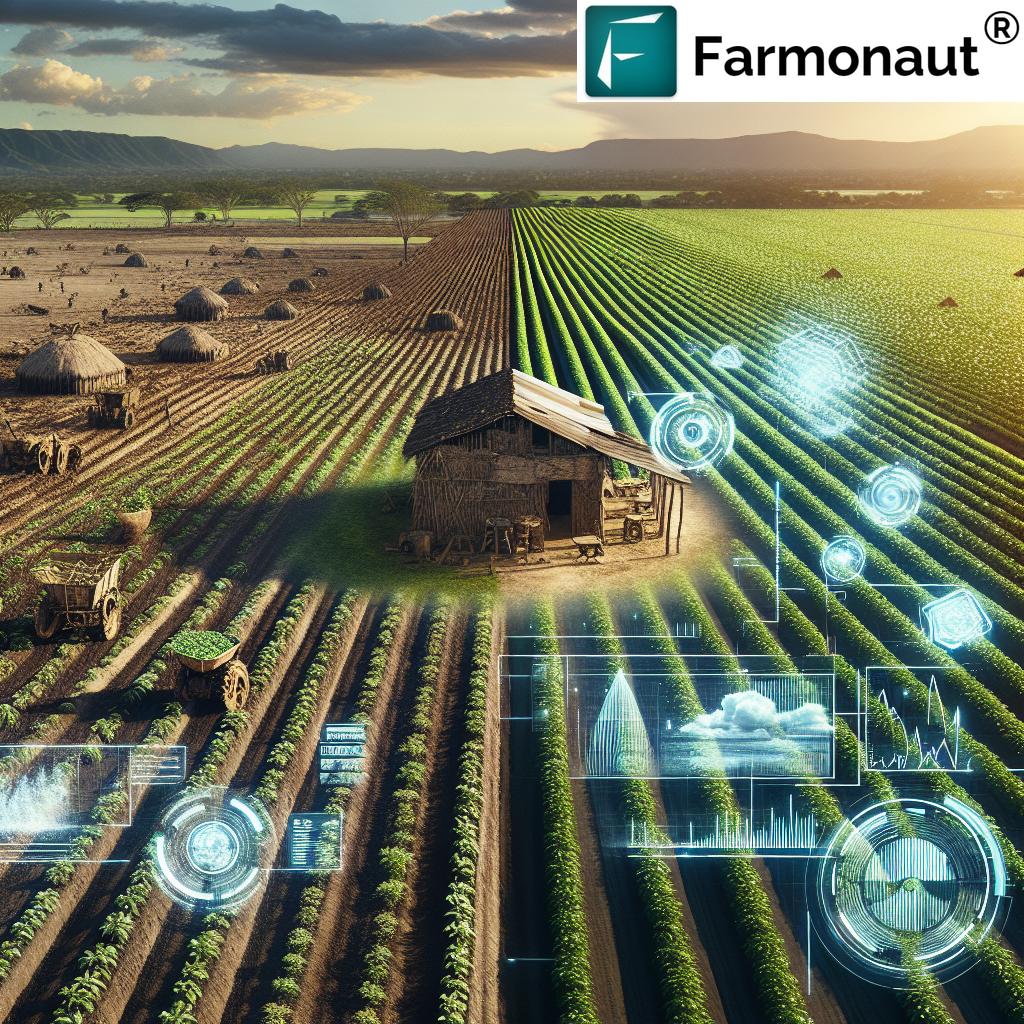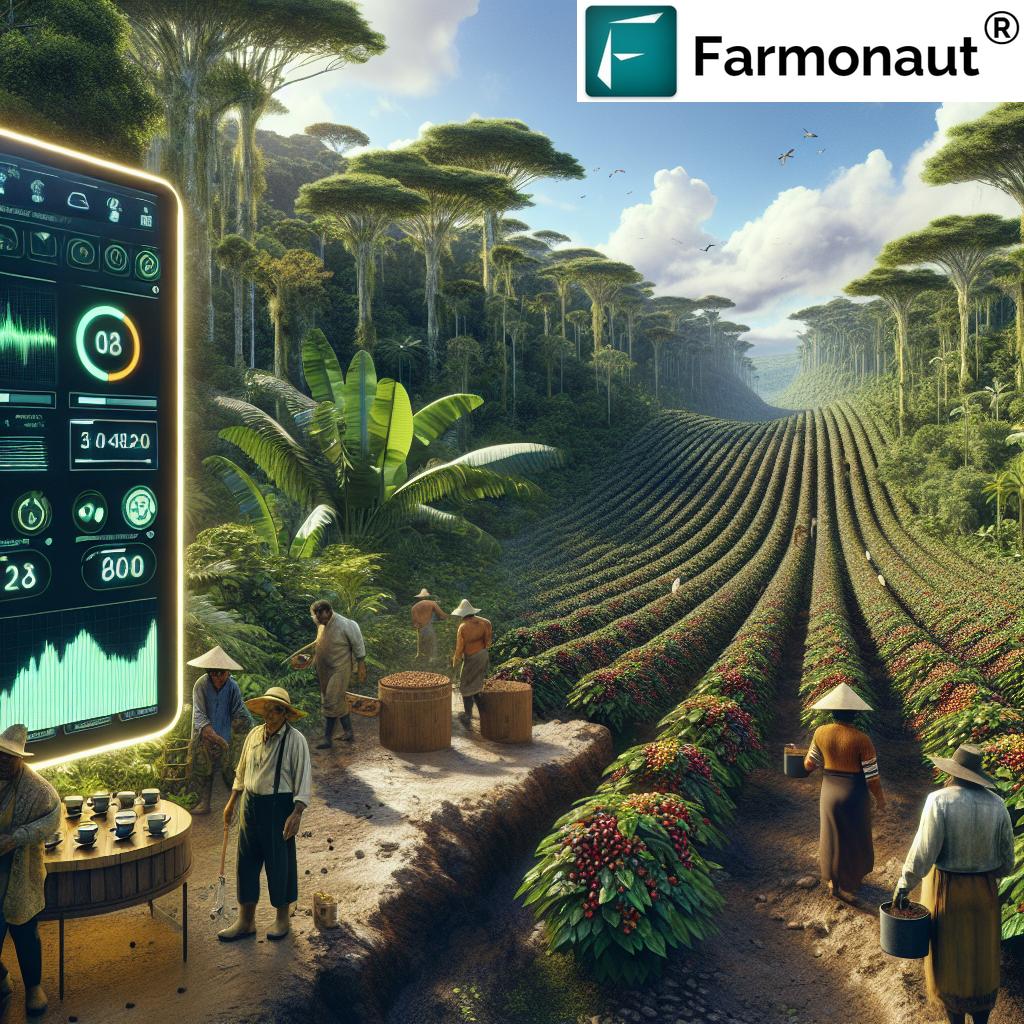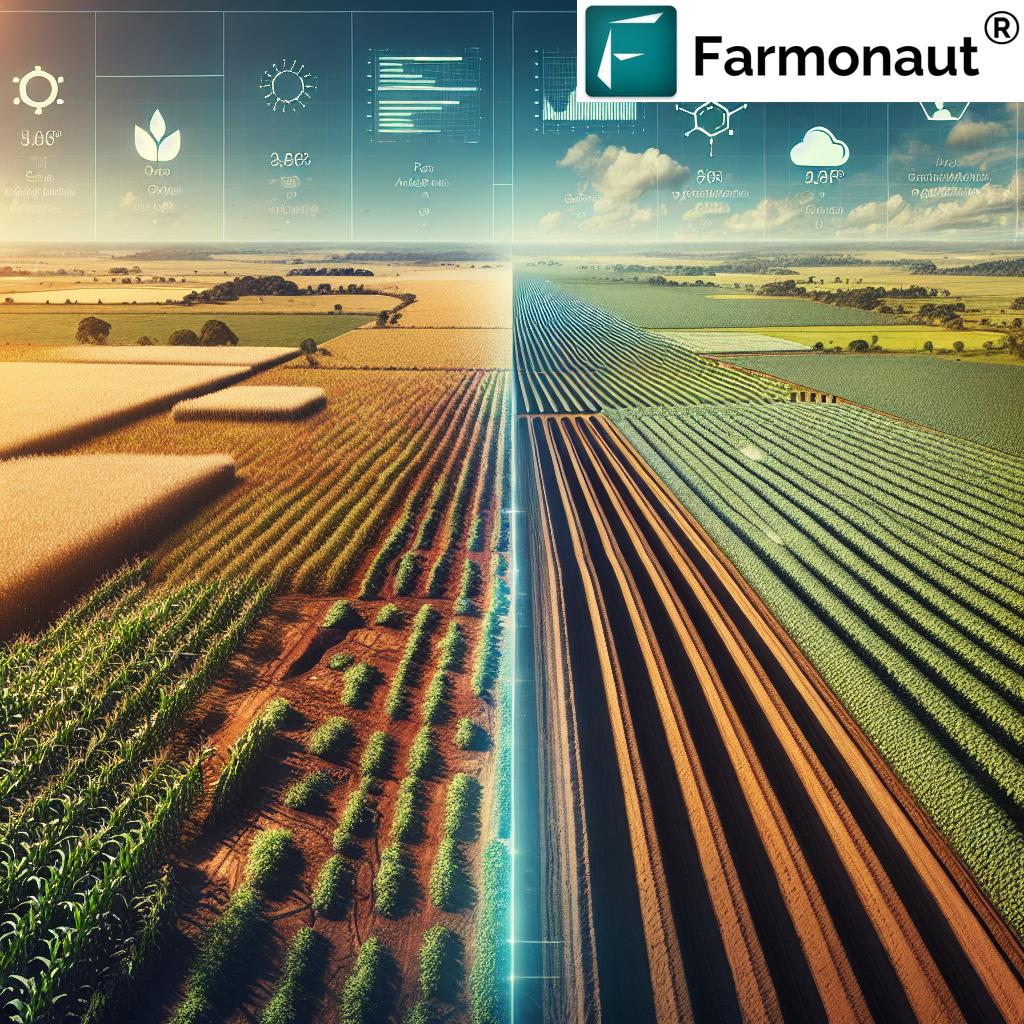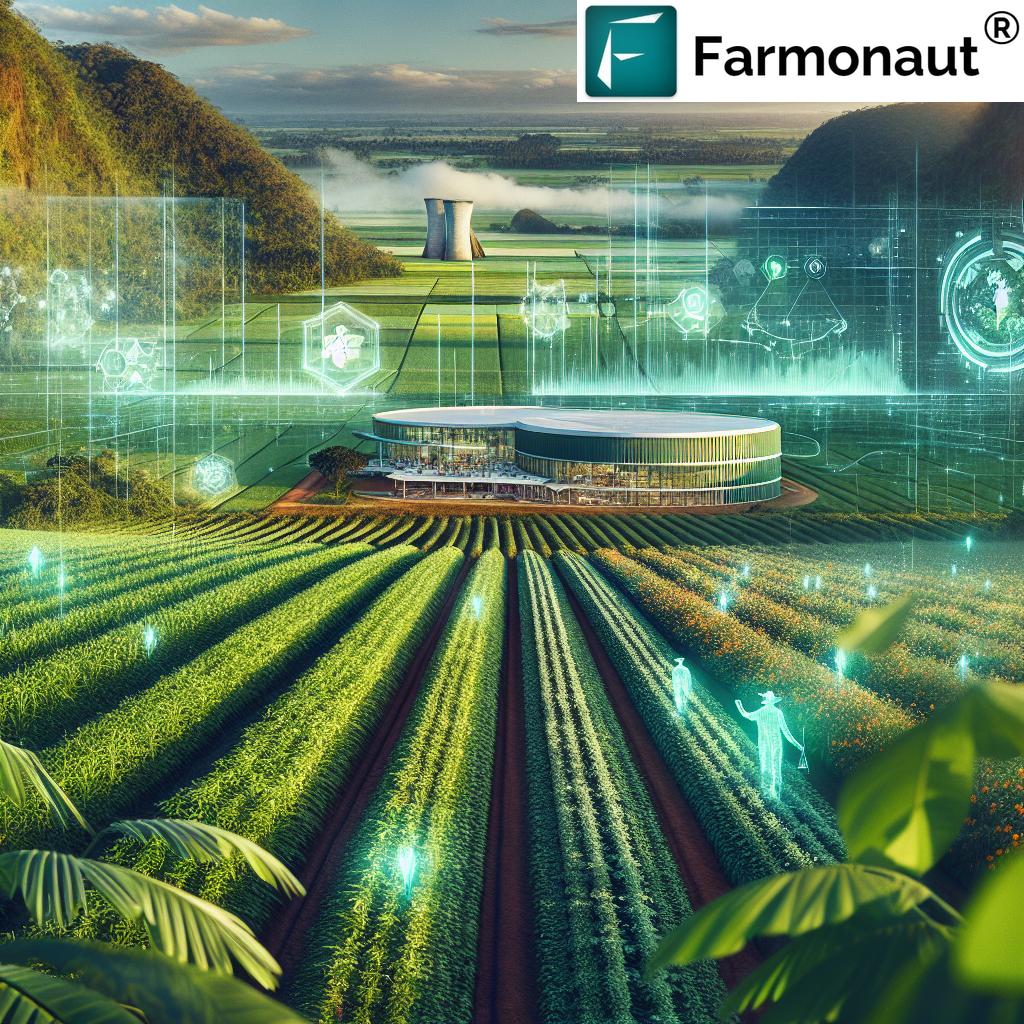Revolutionizing Latin American Coffee: Sustainable Traceability for Empowering Farmers and Protecting Biodiversity
“Latin America’s coffee industry initiative aims to enhance transparency and sustainability across three coffee-producing countries.”
In the vibrant world of Latin American coffee, a revolution is brewing. We’re witnessing a transformative shift towards sustainable coffee production and traceability that promises to reshape the entire coffee supply chain. This innovative initiative is set to empower smallholder coffee farmers, protect precious biodiversity, and bring unprecedented transparency to consumers who crave not just a great cup of joe, but also the assurance that their purchase supports ethical and environmentally-friendly practices.
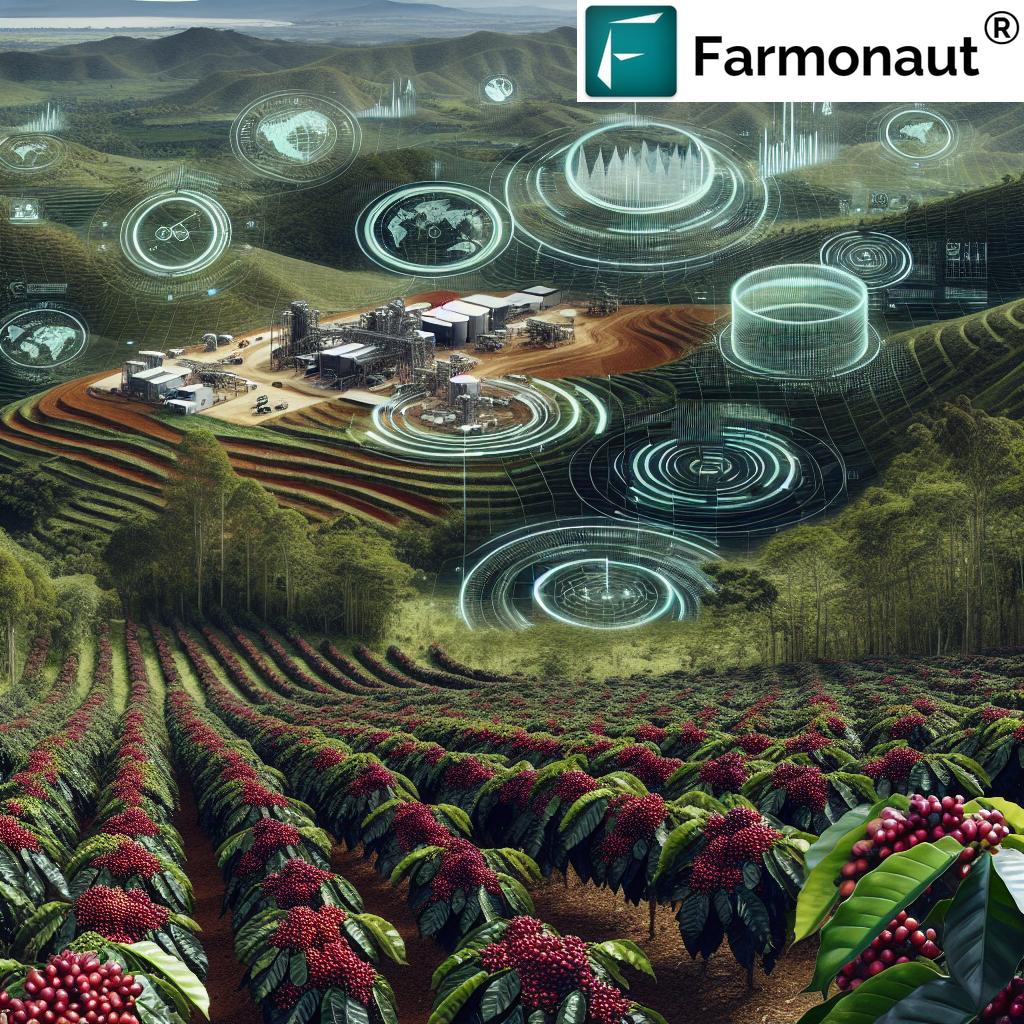
As we delve into this exciting development, let’s explore how this initiative is set to revolutionize the Latin American coffee industry, bringing benefits to producers, traders, and consumers alike. We’ll also examine how cutting-edge technology, like that offered by Farmonaut, can play a crucial role in supporting these efforts.
The Coffee Revolution: A New Era of Sustainability and Traceability
The coffee industry in Latin America is on the brink of a major transformation. A groundbreaking initiative has been launched to enhance traceability within the coffee supply chain, focusing on three key coffee-producing countries in the region. This move comes at a crucial time, as new European Union legislation aimed at combating deforestation is set to take effect by the end of 2025.
The primary objective of this collaboration is to boost transparency along the coffee value chain. By implementing effective traceability systems, we can ensure that sustainably-produced coffee stands out in the market. These systems will not only track coffee from farm to cup but will also promote environmentally-friendly agricultural practices, providing consumers with essential information that empowers them to make ethical choices.
The Power of Traceability in the Coffee Supply Chain
Traceability in the coffee supply chain is more than just a buzzword; it’s a powerful tool that can transform the industry. Here’s how:
- Transparency: Consumers can trace their coffee back to its origin, understanding the journey from farm to cup.
- Quality Assurance: Traceability systems help maintain high standards throughout the supply chain.
- Fair Compensation: With increased transparency, there’s potential for more equitable distribution of profits along the value chain.
- Environmental Protection: Traceability can help verify sustainable and environmentally-friendly practices.
In this context, technology plays a crucial role. Farmonaut, a pioneering agricultural technology company, offers advanced satellite-based farm management solutions that can significantly contribute to these traceability efforts. Through its android, iOS, web/browser App, and API, Farmonaut provides valuable services such as real-time crop health monitoring and blockchain-based traceability.
Empowering Smallholder Coffee Farmers
At the heart of this initiative is the empowerment of smallholder coffee farmers. These farmers, who form the backbone of the Latin American coffee industry, often face numerous challenges, including limited access to markets, financial instability, and vulnerability to climate change.
The new traceability systems and sustainable coffee certification programs aim to address these issues by:
- Providing farmers with better access to international markets
- Ensuring fair compensation for their produce
- Offering training in sustainable agricultural practices
- Improving their resilience to climate change
Farmonaut’s technology can play a significant role in this empowerment process. Their Jeevn AI Advisory System delivers real-time insights, weather forecasts, and expert crop management strategies to farmers. This AI-driven tool analyzes satellite data and other inputs to generate customized advice, improving farm productivity and efficiency.
Protecting Biodiversity: A Key Focus
Latin America is home to some of the world’s most biodiverse regions, many of which overlap with coffee-growing areas. The initiative recognizes the critical importance of protecting this biodiversity while promoting sustainable coffee production.
Here’s how the project aims to protect biodiversity:
- Promoting shade-grown coffee, which preserves forest canopy and provides habitat for diverse species
- Encouraging organic farming practices that reduce chemical inputs and protect soil health
- Supporting agroforestry systems that integrate coffee cultivation with other tree species
- Implementing water conservation measures to protect local ecosystems
Farmonaut’s satellite-based crop health monitoring can assist in these efforts by providing farmers with detailed insights into their land use and vegetation health. This data can help farmers make informed decisions about resource management and conservation practices.
Enhancing Coffee Value Chain Transparency
Transparency in the coffee value chain is crucial for building trust among all stakeholders, from farmers to consumers. The initiative aims to implement innovative tools and sustainable coffee certification systems to improve this transparency.
Key aspects of enhancing value chain transparency include:
- Implementing blockchain technology for secure and transparent record-keeping
- Developing user-friendly apps for farmers to input and access data
- Creating consumer-facing platforms that provide detailed information about coffee origins and production methods
- Establishing third-party verification systems to ensure the accuracy of reported data
Farmonaut’s blockchain-based product traceability solution aligns perfectly with these goals. By integrating blockchain technology, Farmonaut enables traceability solutions that ensure every stage of the product’s journey, from farm to consumer, is transparent and secure.
Explore Farmonaut’s API for advanced traceability solutions
Promoting Environmentally-Friendly Agricultural Practices
Sustainable coffee production goes hand in hand with environmentally-friendly agricultural practices. The initiative aims to promote and implement these practices across the Latin American coffee industry.
Some key environmentally-friendly practices being promoted include:
- Water conservation techniques
- Soil health management
- Integrated pest management
- Energy-efficient processing methods
- Waste reduction and recycling
Farmonaut’s platform can support these efforts through its real-time crop health monitoring and AI-based advisory systems. These tools can help farmers optimize their resource use, reducing waste and environmental impact while improving crop yields.

Improving Compliance with International Markets
As global markets increasingly demand sustainable and ethically produced coffee, compliance with international standards becomes crucial. The initiative aims to help Latin American coffee producers meet these standards, opening up new market opportunities.
Key aspects of improving compliance include:
- Aligning local practices with international certification standards
- Providing training and resources for farmers to meet these standards
- Implementing robust monitoring and reporting systems
- Facilitating connections between compliant producers and international buyers
Farmonaut’s technology can play a significant role in this compliance process. Their satellite-based monitoring and data analytics can provide valuable evidence of sustainable practices, helping farmers demonstrate their compliance with international standards.
Supporting Local Communities
The initiative recognizes that sustainable coffee production is not just about environmental protection, but also about supporting the local communities that depend on coffee farming for their livelihoods.
Key aspects of community support include:
- Promoting gender equality in coffee farming
- Supporting education and healthcare initiatives in coffee-growing regions
- Encouraging diversification of income sources to reduce dependency on coffee
- Preserving local cultural practices and traditional knowledge
While Farmonaut’s primary focus is on technological solutions for agriculture, its tools can indirectly support these community efforts by helping to increase farm productivity and profitability, potentially leading to improved livelihoods for coffee-growing communities.
“Sustainable coffee certification systems can improve compliance with international markets while supporting local communities and biodiversity.”
The Role of Technology in Sustainable Coffee Production
Technology plays a crucial role in enabling and supporting sustainable coffee production and traceability. From satellite imaging to blockchain, various technological tools are being employed to revolutionize the coffee industry.
Here’s how technology is making a difference:
- Satellite Imaging: Provides valuable data on crop health, land use, and environmental conditions
- Blockchain: Ensures secure and transparent record-keeping throughout the supply chain
- AI and Machine Learning: Offers personalized farming advice and predictive analytics
- IoT Devices: Enable real-time monitoring of farm conditions and processing operations
- Mobile Apps: Facilitate easy data input and access for farmers and other stakeholders
Farmonaut’s suite of technologies aligns perfectly with these needs. Their satellite-based crop health monitoring, AI advisory system, and blockchain-based traceability solutions provide a comprehensive toolkit for supporting sustainable coffee production.
The Future of Ethical Coffee Consumption
As we look to the future, it’s clear that ethical coffee consumption will play an increasingly important role in shaping the industry. Consumers are becoming more conscious of the impact of their purchasing decisions, and are demanding coffee that not only tastes good but also does good.
The initiative in Latin America is paving the way for a future where:
- Consumers can easily trace the origin and journey of their coffee
- Farmers receive fair compensation for their sustainable practices
- Biodiversity in coffee-growing regions is protected and enhanced
- Local communities thrive alongside a sustainable coffee industry
- The coffee supply chain becomes more resilient to climate change and market fluctuations
By leveraging technology like Farmonaut’s solutions, we can accelerate this transition to a more sustainable and ethical coffee industry.
Explore Farmonaut’s API Developer Docs for integration options
Comparison: Traditional vs. Sustainable Coffee Production
| Aspect | Traditional Approach | Sustainable Approach |
|---|---|---|
| Environmental Impact | High water usage, chemical inputs, deforestation | Water conservation, organic practices, reforestation efforts |
| Farmer Empowerment | Limited decision-making power, price vulnerability | Increased autonomy, fair compensation, access to markets |
| Biodiversity Protection | Monoculture, habitat destruction | Shade-grown coffee, agroforestry, habitat preservation |
| Supply Chain Transparency | Limited traceability, opaque processes | Full traceability, blockchain-verified transparency |
| Market Compliance | Struggles with international standards | Meets or exceeds global sustainability requirements |
| Community Support | Limited investment in local development | Active support for education, healthcare, and local culture |
Challenges and Opportunities
While the future of sustainable coffee production in Latin America looks promising, it’s not without its challenges. However, each challenge also presents an opportunity for innovation and growth.
- Challenge: Initial costs of implementing sustainable practices and traceability systems
Opportunity: Long-term cost savings and access to premium markets - Challenge: Resistance to change from traditional farming methods
Opportunity: Education and demonstration of improved yields and profitability - Challenge: Complexity of coordinating efforts across diverse stakeholders
Opportunity: Creation of stronger, more resilient coffee communities - Challenge: Climate change impacts on coffee production
Opportunity: Development of climate-resilient coffee varieties and farming techniques
Farmonaut’s technology can help address many of these challenges. For example, their AI advisory system can help farmers adapt to changing climate conditions, while their traceability solutions can facilitate access to premium markets.
The Path Forward: Sustainable Coffee Certification
Sustainable coffee certification plays a crucial role in ensuring that coffee is produced in an environmentally friendly and socially responsible manner. These certifications provide a framework for implementing and verifying sustainable practices.
Key aspects of sustainable coffee certification include:
- Environmental stewardship (soil and water conservation, biodiversity protection)
- Fair labor practices and worker welfare
- Economic sustainability for farmers
- Traceability and transparency in the supply chain
Farmonaut’s technology can support the certification process by providing detailed data on farming practices, environmental conditions, and supply chain movements. This data can be invaluable for both farmers seeking certification and auditors verifying compliance.
Conclusion: A Brighter Future for Latin American Coffee
The initiative to enhance traceability and sustainability in Latin America’s coffee industry represents a significant step towards a more equitable, environmentally friendly, and economically viable future for all stakeholders in the coffee value chain. By leveraging innovative technologies, promoting sustainable practices, and empowering local communities, we can create a coffee industry that not only produces excellent coffee but also protects our planet and supports the livelihoods of millions.
As consumers, we have the power to support this transformation by choosing sustainably and ethically produced coffee. By doing so, we not only enjoy a great cup of coffee but also contribute to positive change in coffee-growing regions around the world.
The future of Latin American coffee is bright, and with continued efforts and support, we can ensure that it remains a source of joy, livelihood, and environmental stewardship for generations to come.
FAQs
- What is sustainable coffee production?
Sustainable coffee production involves growing and processing coffee in ways that are environmentally friendly, socially responsible, and economically viable. This includes practices such as water conservation, soil health management, fair labor practices, and biodiversity protection.
- How does coffee traceability benefit consumers?
Coffee traceability allows consumers to know the exact origin of their coffee, how it was produced, and its journey from farm to cup. This transparency enables consumers to make informed choices and support sustainable and ethical coffee production.
- What role does technology play in sustainable coffee production?
Technology plays a crucial role in sustainable coffee production by providing tools for efficient resource management, real-time crop monitoring, and supply chain transparency. Solutions like Farmonaut’s satellite-based monitoring and blockchain traceability are examples of how technology is revolutionizing the industry.
- How does sustainable coffee production benefit local communities?
Sustainable coffee production often involves fair compensation for farmers, investment in local infrastructure and education, and preservation of local cultures. This approach helps to create more resilient and prosperous coffee-growing communities.
- What is the importance of biodiversity in coffee production?
Biodiversity is crucial for maintaining healthy ecosystems in coffee-growing regions. It helps with natural pest control, improves soil health, and can enhance the flavor profile of coffee. Sustainable coffee production aims to protect and enhance this biodiversity.





